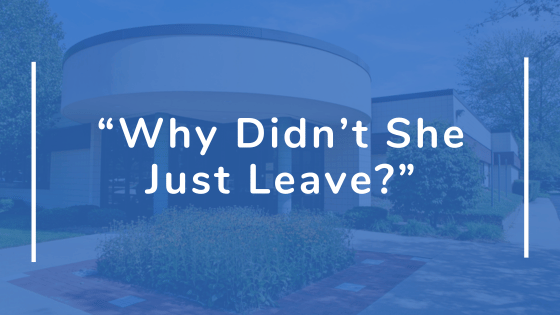A message from Beth Larsen
Executive Director
Resilience: Advocates for Ending Violence
In the wake of a recent domestic violence homicide that took place in our community, we know many are asking, “Why didn’t she just leave?”
Crimes such as these are difficult to comprehend. As a bystander, it’s natural to be angry and fearful, to place blame on the victim, to make assumptions, and to expect immediate solutions. Many times the easiest conclusion is that if the victim had just left, this never would have happened. The frightening reality is that ending an emotionally and/or physically abusive relationship is when homicides are most likely to occur.* Abusers often use the threat of homicide to paralyze their victims, keeping them stuck in the cycle of abuse.
Other reasons why victims don’t just leave:
Children and Pets. Victims know that the violence will not magically stop when the relationship ends; and so may choose to stay in order to protect children and companion animals from the abuser.
Economic dependence. Victims of abuse may be prevented from working outside the home, need permission to access money, or have their credit intentionally ruined by the batterer. Without financial assets of their own, they remain dependent on their abuser.
Dependence on substances. Introduction to drugs and alcohol is often a tactic used to encourage dependency upon the batterer.
Trauma history. Many survivors have been overcoming barriers their entire lives. Maybe they’ve survived childhood sexual assault or child abuse, which can compound the internal narrative that they are not worthy of something better. Trauma results in a physiological change within our bodies and impacts us physically and emotionally.
Love. Domestic violence relationships do not begin with disrespect or violence, and the relationship is not violent or disrespectful 100% of the time. Many victims see hope when a batterer promises to change.
As an agency, Resilience: Advocates for Ending Violence would like to encourage the community to ask different questions.
- How can we better hold batterers accountable?
- How do we create a coordinated community response to domestic violence that addresses the complex trauma many survivors face?
- How do we effectively engage men and boys in the conversation?
Our mission at Resilience is not only to respond to, but also to reduce and prevent domestic and sexual violence in our communities. These are questions we will continue striving to answer. We will continue to engage the community in creating comprehensive, systemic programming designed to end domestic and sexual violence.
Resilience serves local victims of abuse – women, men, and children – through crisis, supportive, and preventative services. Our 24-hour helpline can be reached by calling 616.392.1970 (English) or 616.355.9755 (Spanish). Walk-in services are available at our Holland Program Center from 9am-5pm Monday to Friday.
*“Findings from the National Violence Against Women Survey;” National Institute of Justice and Centers for Disease Control and Prevention; July 2000, pg. 37.
